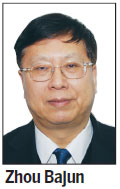'Middle ground', 'middle way' approaches unrealistic
Updated: 2014-04-16 06:47
By Zhou Bajun(HK Edition)
|
|||||||
As the public consultation on arrangements for the Chief Executive (CE) election by universal suffrage in 2017 and the Legislative Council (LegCo) election in 2016 enters the final month, a couple of alternative approaches have emerged. This is in an attempt to narrow the distance between the opposition camp and the patriotic one. These two seem plausible to some people because they think both sides can accept them. That is why they call one the "middle way" and the other the "middle ground".
On March 24, Michael Davis, a law professor at the Hong Kong University, wrote an open letter to Chief Secretary for Administration Carrie Lam. He suggested a compromise electoral plan he thought was compatible with the Basic Law and international standards of democracy. With the opposition's call to allow registered voters to nominate CE election candidates, Davis proposed "public recommendation" - a non-binding practice allowing voters to recommend hopefuls for consideration by the Nominating Committee. He suggested setting up an independent working group, headed by a member of the judiciary, to make recommendations on how to make the Nominating Committee broadly representative. He also proposed substantial increases to the committee's overall electoral base, so people who want to vote for its members can do so. Moreover, Davis suggested submitting anyone to public ballot who wins the support of 12.5 percent of Nominating Committee members; and anyone who collects 10,000 voters' signatures should be considered by the Nominating Committee. He criticized suggestions to cap the number of candidates and allow block voting. This would let each committee member cast multiple votes to name candidates, meaning a hopeful would need majority support to become a candidate.
Now that Davis discarded civil nomination and party nomination, he seems to be in the "middle ground" of the political spectrum. Nevertheless, his plan is favorable to the opposition. First, like many "pan-democrats", Davis insisted on so-called international standards of democracy - the International Covenant on Civil and Political Rights - along with the Basic Law, as the legal ground for universal suffrage in Hong Kong. In fact, only the Basic Law and relevant decisions by the National People's Congress Standing Committee (NPCSC) can decide the future of Hong Kong's political reform.

Second, Davis suggested an independent working group headed by a member of the judiciary to oversee formation of the Nominating Committee, apparently intent on sharing the constitutional authority with the central government. According to the Basic Law, only the central government has the sovereign power to decide the formation of the Nominating Committee before or after universal suffrage is implemented.
Third, Davis proposed a "public ballot" in CE candidate nomination - anyone who secures the support of 12.5 percent of the Nominating Committee members should qualify for a "public ballot". Anyone who collects 10,000 voters' signatures should be given consideration by the Nominating Committee. Therefore, despite the non-binding nature of Davis' "public recommendation", its function will be the same as "civil nomination".
Last but not least, Davis wants no limitation of the number of candidates in the CE election by universal suffrage. If this occurs, at least one opposition representative can run for CE.
Anyone familiar with the city's political reforms can see that a "middle ground" plan will never be accepted by the patriotic camp. That is why a "middle way" proposal has been put forward - tentatively. It indicates that the opposition parties accept that CE election by universal suffrage in 2017 is out of reach. As a trade-off, the central government should promise that the arrangement of the CE election by universal suffrage will be modified to meet the opposition's demands. The "middle way" plan is another attempt to open the door for the opposition to join the CE race in 2022.
Article 45 of the Basic Law clearly states: "The ultimate aim is the election of the Chief Executive by universal suffrage upon nomination by a broadly representative Nominating Committee in accordance with democratic procedures." If the so-called "middle way" plan becomes a reality, the "ultimate aim" would be a half-way situation instead of the final destination.
In conclusion, neither the "middle way" plan nor the "middle ground" proposal conforms with the Basic Law and relevant decisions by the NPCSC. The reason why is clear - there is a distinct line between the views of the opposition camp and the "Love the Country and Love Hong Kong" side. They stand little chance of achieving consensus on how to implement universal suffrage before the five-month public consultation ends. This means, according to the opposition, Hong Kong will have to endure the "Occupy Central" campaign for not satisfying their political ambitions. The community and the government should now prepare for the worst.
The author is a veteran current affairs commentator.
(HK Edition 04/16/2014 page9)